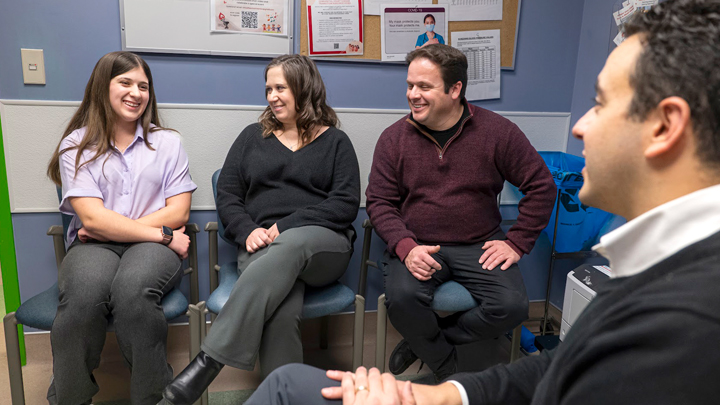
February 23, 2024

The Heathcote family — Haley, left, with her parents Delta and Mike — enjoy a visit with their pediatric cardiologist Dr. Michael Khoury, who keeps an eye on their cholesterol levels. Haley and her brother Ryan (not shown) live with Familial Hypercholesterolemia (FH), a genetic disorder that increases the likelihood of having coronary heart disease or a heart attack at a young age. Photo supplied.

Dr. Michael Khoury enthusiastically gets down to business with his young patient Ryan Heathcote. Photo supplied.

Haley Heathcote has her regular checkup with Dr. Michael Khoury. Photo supplied.
Story by Mathew McCallum
EDMONTON — One simple blood test has given a new outlook on life to the family of Mike and Delta Heathcote and their children Haley, 12, and Ryan, 8.
Mike’s father, grandmother and other distant family members experienced heart disease as adults. Knowing this could be a serious concern for his entire family, Mike has always tried to manage his cholesterol to take the best care of himself that he can.
When he started seeing a new physician in 2017, they opted to look further into his heart health and completed more testing. Mike knew about his cholesterol levels. What he did not expect is to be diagnosed with Familial Hypercholesterolemia (FH), a genetic disorder that increases the likelihood of having coronary heart disease or a heart attack at a young age. Fortunately, with early detection, FH can be managed with a long-term treatment plan.
“I wish this was something I could have had testing for when I was a kid,” says Mike. “I would have taken it much more seriously.”
For people with FH, while exercise and healthy eating habits are important, they’re often not enough to lower cholesterol to a healthy level. Medicines, such as statins, are needed to help control cholesterol levels. Experts say finding the disorder early and treating it can reduce the risk of heart disease by about 80 per cent.
Armed with new knowledge, Mike arranged for the testing of his children, Haley, 12, and Ryan, 8, who were both diagnosed with FH.
FH is a genetic condition; there’s a 50-50 chance a parent will pass it to their kids. The early detection for his children has prompted the Heathcote family to make changes to their nutrition and lifestyle — as well as starting statin treatment early — to improve their length and quality of life.
Just one pill a day and regular check-ups with Dr. Michael Khoury, the family’s Pediatric Cardiologist at the Stollery Children’s Hospital, has given Mike and Delta Heathcote hope that their children won’t have to worry about heart disease down the road, as others have in Mike’s extended family.
Research shows that one in 250 Albertans have FH, which is generally silent and asymptomatic. More than 90 per cent of people with FH go undiagnosed well into adulthood, leaving them unaware of their risk of experiencing a sudden catastrophic cardiac event like a heart attack.
In addition to high cholesterol levels, your doctor may also be able to detect these physical signs of FH during a clinical exam:
When a physician suspects a patient has FH, the diagnosis can be confirmed by a referral for genetic testing and counselling.
Dr. Susan Christian, Genetics Counsellor with Alberta Precision Labs, and Dr. Khoury, Pediatric Cardiologist with the Stollery Childrens Hospital, are encouraging patients to request lipid screening at any time after the age of 2 to detect FH as early as possible. To this end, they recently led a study of cholesterol assessment rates in Albertan children, finding that fewer than five per cent had cholesterol checked in their first decade of life.
This screening can be done with a single sample of blood work, and only needs to be completed once
“Young kids have young parents. If you find FH in a child, you can find it in one of the parents,” says Dr. Khoury. “If the child has FH, one of the parents will have it. When you find one case of FH, you subsequently find many more and can reduce the chance of a catastrophic event.”
Dr. Christian adds: “A small percentage of children are having lipid screening and only a few of those with elevated lipid levels are being treated. I’m not sure that it’s well-appreciated how common familial hypercholesterolemia is — and that treatment in childhood can dramatically reduce the chance of heart disease for these children later in life.
“With early intervention, this screening can greatly impact the health and wellness of those genetically predisposed to FH, and ultimately save them from having a tragic event early in life.
Mike and Delta say they’re grateful they received their family’s diagnosis when they did — and were able to start managing the disorder early and effectively — and urge other families to take advantage of this potentially life-saving testing.
For more information about lipid screening and Familial Hypercholesterolemia, talk to your family doctor or visit the Canadian Heart Patient Alliance.